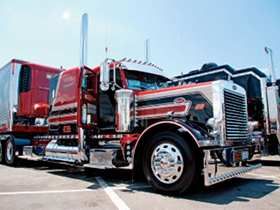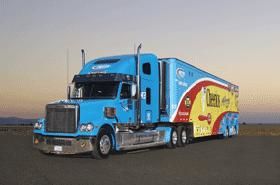I Single-handedly Ruined My Life Trying To Transition Into Trucking
Topic 33949 | Page 3
Mountains of great advice here. I'll just add, like Old School said, it's about taking charge. Before trucking, when there was a problem I told someone and they told someone who eventually fixed it. That mindset carried over. For example, when I first started trucking and had a breakdown issue I'd send a message and wait what seemed like an eternity as my clock ticked down for a solution from the company. I eventually realized that I could find the solution myself and include my plan in that initial message and head for a service center en route to my destination. You can find how best to help the situation you're in on your own, within the parameters of your company.
Fedex freight will require a year experience, unless you get hired as a driver apprentice and you go through their program. FedEx may also require dock work, depending on the position and the building.
Like others have said, stick it out. Find a hobby to occupy your mind while you're not driving so you're not fixated on a bad day and you can leave work at work.

Double what Banks said about a hobby! I’m a gamer so I have my Switch (Nintendo) with me. I’ve also started cooking on my truck as I love to do that as versus remaking a freezing everything at home etc. I also listen to ebooks and catch up on novels I missed as I drive or relax at night!
Can’t say enough about a hobby, this job can be boring and frustrating at times. We need something we enjoy to unwind and remind us we are human!
Fedex freight will require a year experience, unless you get hired as a driver apprentice and you go through their program. FedEx may also require dock work, depending on the position and the building.
Like others have said, stick it out. Find a hobby to occupy your mind while you're not driving so you're not fixated on a bad day and you can leave work at work.
One more thing i will add...
IF you choose to leave trucking and go back to a different job... make sure you renew your DOT physical accordingly. Otherwise you will need to go through the schooling potion again. Keep up with the medical and you will keep your CDL active.
CDL:
Commercial Driver's License (CDL)
A CDL is required to drive any of the following vehicles:
- Any combination of vehicles with a gross combined weight rating (GCWR) of 26,001 or more pounds, providing the gross vehicle weight rating (GVWR) of the vehicle being towed is in excess of 10,000 pounds.
- Any single vehicle with a GVWR of 26,001 or more pounds, or any such vehicle towing another not in excess of 10,000 pounds.
- Any vehicle, regardless of size, designed to transport 16 or more persons, including the driver.
- Any vehicle required by federal regulations to be placarded while transporting hazardous materials.
DOT:
Department Of Transportation
A department of the federal executive branch responsible for the national highways and for railroad and airline safety. It also manages Amtrak, the national railroad system, and the Coast Guard.
State and Federal DOT Officers are responsible for commercial vehicle enforcement. "The truck police" you could call them.
OOS:
When a violation by either a driver or company is confirmed, an out-of-service order removes either the driver or the vehicle from the roadway until the violation is corrected.

Hi all, thanks so much for the advice! I just finished up training at WE but unfortunately they had no flat bed trainers so i was forced to train dryvan. SET ME UP FOR FAILURE!
I’m on my 2nd load now, 1st load took me about 6-7hrs to strap correctly once i finally got the high dropped trainer out. 2nd load took me about 5-6hrs to tarp for the first time and strap. (first load was pre tarped)
Anywho the load was 81k so i had to unsecure, remove an item and secure again. fixed the overweight issue but had no idea i was 2k over the limit on my tandem axles (thanks WE for the dryvan trainer) and got my FIRST Overweight ticket! YAY!
But all jokes aside im really struggling and it’s only my 2nd load, i’ve ran out of my 14 each day i had to secure. If ANYONE has any tips or tricks, or is just available to answer my dumb questions about flatbed i’d greatly appreciate it. Videos are not doing me justice when i don’t know exactly what i’ll be picking up before i arrive
Tandem:
Tandem Axles
A set of axles spaced close together, legally defined as more than 40 and less than 96 inches apart by the USDOT. Drivers tend to refer to the tandem axles on their trailer as just "tandems". You might hear a driver say, "I'm 400 pounds overweight on my tandems", referring to his trailer tandems, not his tractor tandems. Tractor tandems are generally just referred to as "drives" which is short for "drive axles".
Dryvan:
A trailer or truck that that requires no special attention, such as refrigeration, that hauls regular palletted, boxed, or floor-loaded freight. The most common type of trailer in trucking.Save your drama and focus on learning how to do this. The company cannot set you up for failure. You are the only one who can do that.
Be honest with yourself. Be honest with us. You don't learn securement and tarping from the trainer. Those things are taught in class before going with the trainer. Training is all about how the company dispatches you, fueling procedures, and general stuff like that. Those things are the same for dry-van and flatbed.
In trucking, you hold your own fate. Get that idea firmly planted in your mind and conduct yourself in a way that leads to your success.
HOS:
Hours Of Service
HOS refers to the logbook hours of service regulations.Ask us all the "dumb questions" you like. There are plenty of flatbedders here who can help you.
Are you aware we have an excellent training course on flatbed securement? It's absolutely free too. You'll find it in our High Road CDL Training Program.
CDL:
Commercial Driver's License (CDL)
A CDL is required to drive any of the following vehicles:
- Any combination of vehicles with a gross combined weight rating (GCWR) of 26,001 or more pounds, providing the gross vehicle weight rating (GVWR) of the vehicle being towed is in excess of 10,000 pounds.
- Any single vehicle with a GVWR of 26,001 or more pounds, or any such vehicle towing another not in excess of 10,000 pounds.
- Any vehicle, regardless of size, designed to transport 16 or more persons, including the driver.
- Any vehicle required by federal regulations to be placarded while transporting hazardous materials.
Hey Dre, my email is in my bio. If you shoot me an email I’d be happy to send you my number and coach you over the phone any time you have questions about securement. I don’t claim to know even close to everything about flatbed but I have been doing it for a while and have hauled a good variety of loads. You’re also welcome to post pics of loads on the forum if you have questions about your securement.
Also, in the green book (the FMCSR) section 393.100-393.136 is your best friend as a flatbedder. Read it, study it, internalize it. If you do that, you will be light years ahead of most newbies.
Finally, while we are happy to help, I would encourage you to find out what support structure western express has for their new flatbed drivers as that will be the easiest and most direct route for you to get any and all help you may need.
Fm:
Dispatcher, Fleet Manager, Driver Manager
The primary person a driver communicates with at his/her company. A dispatcher can play many roles, depending on the company's structure. Dispatchers may assign freight, file requests for home time, relay messages between the driver and management, inform customer service of any delays, change appointment times, and report information to the load planners.New Reply:
New! Check out our help videos for a better understanding of our forum features

















Preview:








 TT On Facebook
TT On Facebook
You’ve gotten excellent advice here. I couldn’t add a thing to it. Where I can offer some advice is regarding your question on FedEx freight. I spent 20 years in LTL. When I started it was hard to get into. I spent 2 years on a “casual board” before getting essentially “journeyman” status. Today the LTL industry is quite different. Many LTL companies offer a “dock to driver” program. Those programs are intended for CDL aspirants but you may be able to leverage your warehouse experience against the misfortunes you’ve encountered. It would be worth a conversation especially since you’ve already got your CDL. Make no mistake, you’ll work the dock while they get to know who you are. Good luck!
CDL:
Commercial Driver's License (CDL)
A CDL is required to drive any of the following vehicles:
LTL:
Less Than Truckload
Refers to carriers that make a lot of smaller pickups and deliveries for multiple customers as opposed to hauling one big load of freight for one customer. This type of hauling is normally done by companies with terminals scattered throughout the country where freight is sorted before being moved on to its destination.
LTL carriers include:
HOS:
Hours Of Service
HOS refers to the logbook hours of service regulations.